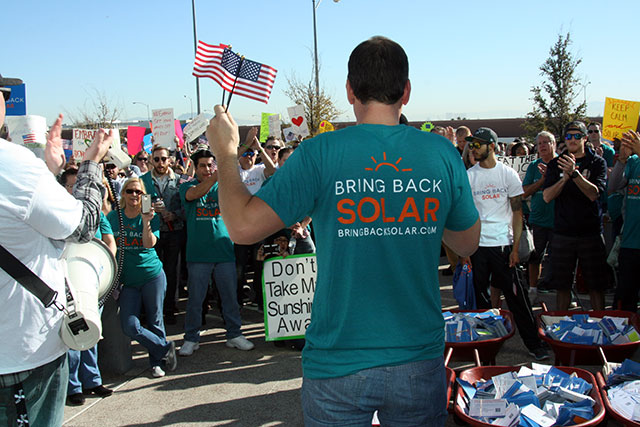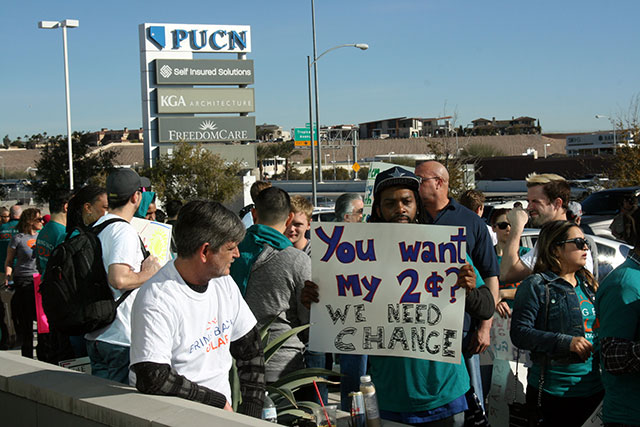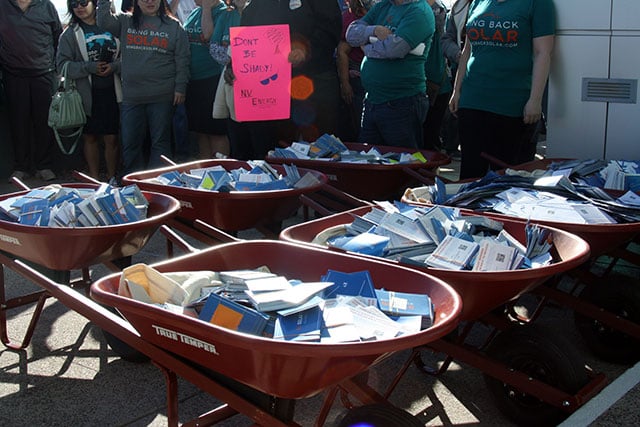
The Nevada Public Utilities Commission’s two unassuming office buildings in Carson City and Las Vegas, usually only occupied by attorneys and engineers, are now the staging ground for a populist revolt against monopoly utility NV Energy, owned by billionaire Warren Buffett’s multinational conglomerate Berkshire Hathaway.
Nevadans have turned out in force against new regulations enacted by the three-member commission that effectively wiped out the fastest growing residential solar market in the United States. This is not your run-of-the-mill environmentalist versus industry fight, with government cowering in the corner. This is a conflict that has brought people from all walks of life and all political leanings out in force. It is a struggle that defies categorization and ideology – a struggle that ultimately may decide the future of distributed, people-owned power throughout the nation.
The people in Nevada are mad and they aren’t going to take it anymore.
Solar Access Under Attack
 Mark Ruffalo and Debbie Dooley speak before a Nevada Public Utilities Commission meeting in Las Vegas on January 13, 2016. (Photo: Vote Solar)
Mark Ruffalo and Debbie Dooley speak before a Nevada Public Utilities Commission meeting in Las Vegas on January 13, 2016. (Photo: Vote Solar)
In December 2015, the Public Utilities Commission of Nevada (PUCN), appointed by Nevada Republican Gov. Brian Sandoval, voted to slash net metering credits and raise fixed fees on solar customers by 40 percent, making it prohibitively expensive for most Nevadans to go solar, and also making it uneconomical for the over 17,000 people who had already switched to solar power. Many solar rooftop companies shut down, hundreds of solar workers lost their jobs and homeowners are left with higher energy bills than if they would never have gone solar.
Although many were caught off guard, Louise Helton, owner of the only woman-owned solar installation company in Las Vegas, 1 Sun Solar, wasn’t surprised.
“Solar is a political animal,” Helton told Truthout. “It shouldn’t be but it always has been.”
One of the most striking characteristics of Nevada’s solar fight is the broad range of people engaged in the struggle.
The new net metering rate plan was enacted in response to complaints from NV Energy that solar customers were shifting over $16 million in fixed costs annually to non-solar customers. The PUCN sided with NV Energy’s numbers, disregarding its own independently commissioned study that showed there are no significant costs to non-solar customers from people installing solar on their houses.
Helton was even less surprised when on February 12, 2016, the same body refused to protect existing solar rooftop customers and grandfather in their investments for 20 years under the old rates.
“No one was hopeful that we would get satisfaction from the commission,” she said.
In a move PUCN Chairman Paul Thomsen referred to as a “compromise,” the PUCN voted to give solar customers more time to adjust to the new rules, slowing the phase in of new rates from four to 12 years. That decision, for phased implementation, according to solar supporters, does nothing to remedy the irreversible damage already done.
The public outcry in Nevada and around the country was swift and the organizing effort to overturn the PUCN’s decision is diverse and formidable.
A Power Struggle With National Implications
 Solar advocate holds up sign during solar rally before a Nevada Public Utilities Commission meeting in Las Vegas on February 12, 2016. (Photo: Sam Lopaze)
Solar advocate holds up sign during solar rally before a Nevada Public Utilities Commission meeting in Las Vegas on February 12, 2016. (Photo: Sam Lopaze)
The power struggle in Nevada is not unique, although it may be one of the more egregious power plays by a utility. Similar fights are playing out all over the country as regulated monopoly utilities fight for control over who gets to own power generation.
Solar is booming in the United States, in part because of a precipitous drop in the price of panels and a 30 percent federal solar tax credit, which was extended in December 2015. Up until the decision by the PUCN that same month, Nevada was a poster child for what could be done with rooftop solar. In 2015, the Solar Foundation reported over 8,000 jobs in solar in the state and it ranked number one in solar jobs per capita. This year will be markedly different.
Many Nevadans are offended that the PUCN and NV Energy are trying to frame the conflict between NV Energy and the people as an issue of fairness between solar homeowners and non-solar homeowners.
“We are fighting Big Brother and their allies that keep ratepayers shackled to the monopolies.”
“Everyone knows there is tremendous value from solar customers,” said Scott Shaw, director of research and commercial development for Go Solar, an energy efficiency and solar installation company in Las Vegas. “Most Nevadans, even if they don’t have solar on their homes now, aspire to have solar. This is a blatant power move to keep control in the hands of NV Energy. This decision was the exact opposite of common sense.”
Currently, as a regulated monopoly, NV Energy is guaranteed a profit by the government. The utility is allowed a 10.5 percent return on equity.
NV Energy’s business model doesn’t play well with rooftop solar and distributive energy. Rooftop solar customers supply power to the grid during peak energy use times and then are credited an equal number of kilowatt-hours if they supply more than they use, hence the net in net metering. There is no 10.5 percent profit in this arrangement for NV Energy. If, however, NV Energy builds a new gas-fired power plant, they will be able to increase customer rates to pay for it and make that profit. Purchasing energy from myriad energy suppliers, which is what rooftop solar customers are, rather than building a new gas-fired power plant, would most likely be cheaper for their customers but they are not guaranteed a profit by the government.
It makes sense that Warren Buffett’s Berkshire Hathaway purchased NV Energy in 2013 for $5.6 billion. “Owning utilities isn’t a way to get rich,” Buffett said. “It’s a way to stay rich.” The government ensures that.
Uncommon Alliances
 Wheelbarrows full of 55,000 solar support postcards delivered to the Nevada Public Utilities Commission on February 12, 2016. (Photo: Sam Lopaze)
Wheelbarrows full of 55,000 solar support postcards delivered to the Nevada Public Utilities Commission on February 12, 2016. (Photo: Sam Lopaze)
Most Nevadans are not buying NV Energy’s arguments. They are frustrated that the utility has so much power and that their government is protecting the interests of a monopoly over their own. A recent poll showed that 89 percent of Nevadans believe that the commission made the wrong decision when it ended net metering. In less than three weeks, solar supporters gathered 55,000 commitment cards, the same number of petition signatures needed to put the matter on a referendum ballot in November.
One of the most striking characteristics of Nevada’s solar fight is the broad range of people engaged in the struggle. It’s not often that the Libertarian Party of Nevada and the Sierra Club stand together. When conservatives and liberals agree on something, that’s when interesting things start to happen.
As Jessica Scott, regional manager for the nonprofit organization Vote Solar, an intervening party in the PUCN case, put it, “This isn’t a conservative issue or a liberal issue. This is a Nevada issue.”
Debbie Dooley, president of Conservatives for Energy Freedom and the Green Tea Coalition, has been active in these solar fights all over the country. What she has seen in Nevada isn’t unique, but, she says, it is the most outrageous example of a utility trying to protect its profits and of a public utilities commission acquiescing to whatever the utility wants.
To Dooley, going solar is about freedom.
“We are fighting Big Brother and their allies that keep ratepayers shackled to the monopolies,” she said. “NV Energy has willing accomplices in the state officials and members of the PUCN.”
The solar organizers emphasize the massive amount of effort NV Energy and the PUCN are putting into convincing people that they are trying to protect the poor from rich solar rooftop owners.
“Solar knows no sex, no age, no economic status and no race,” said Chandler Gray, a volunteer organizer for the Bring Back Solar campaign and former employee of SolarCity. “A majority of our customers are those on a fixed income looking to save $20 per month. NV Energy is spreading the myth that solar is only for rich people; it’s such a lie.”
Louise Helton, owner of 1 Sun Solar, echoes Gray’s sentiments. “My customers are folks who are looking to be strategic with their limited resources,” she said. “Overwhelmingly, people on a fixed income are the largest portion of our customers. They’ve made hard decisions about taking money out of retirement accounts and they found, under the previous rules, that it made sense for them.”
At the PUCN meeting on February 12, during which the commission members decided not to grandfather in existing solar customers, Nevada residents stressed that cost savings really are often a critical factor in choosing to go solar.
“I am a widow. In 2013, after I lost my husband, I needed to reduce costs as much as possible,” said resident Donna Waldron, explaining her choice. “Lots of us have to do that when we’ve gone to a fixed income.”
Similarly, Vicki Early moved to Nevada as a retiree because she could afford a home on her fixed income. She entered into a solar lease because it was good for the environment and she could stabilize her energy costs. She politely and firmly addressed the commissioners, saying: “My first thought is this has to be a political test, that someone with power is behind the scenes pulling strings for their own benefit. I just hope that somehow, what I have to say, makes a difference.”
Yet Chairman Paul Thomsen seemed to have already made up his mind. At the end of the hearing before he made his “compromise” proposal, he said that non-NEM ratepayers (ratepayers without solar panels on their homes) consisted of “middle- and low-income families.” The rich, he implied, are taking from the poor.
In a way, Thomsen is right. The rich are taking from the poor – but it’s not in the way he implies. The reality is that homeowners from across the economic spectrum are subsidizing NV Energy. When NV Energy brings expensive new centralized infrastructure online, ratepayers are required to pay for it. In the case of rooftop solar, individuals are investing a significant portion of their own money in infrastructure to bring new, clean energy on to the grid. Meanwhile, NV Energy takes solar customers’ renewable energy credits to sell and use toward their state renewable energy standard requirements.
Naomi Duerr, a geologist, Reno City Councilmember, and solar rooftop customer, summed it up in a comment to Truthout: “We are now paying NV Energy for the privilege of providing them with solar energy.”
“We Will Keep Going Until We Fix It”
Solar supporters might not have as much money or as many lobbyists as the giant utility, but they have something more important, said Helton: “I have my voice and an ability to organize in my community. We will keep going until we fix it.”
The solar industry has filed numerous legal challenges to the PUCN’s decision, but solar advocates aren’t leaving the outcome to the courts alone. They are turning to the ballot box. Organizers are working to get a measure on the November ballot that repeals a state law that passed in 2015 giving the PUCN the authority to make changes to the net metering law. Hundreds of volunteers are lined up to begin gathering signatures once the ballot language is approved. If the recent gathering of the 55,000 support signatures in less than three weeks is any indication of Nevadans’ support, then getting it on the ballot is already a done deal. Unsurprisingly, a legal challenge to the referendum was just filed by a political action committee calling themselves Citizens for Solar and Energy Fairness.
Some solar activists are even campaigning for the state legislature, running on platforms that emphasize bringing solar back. Solar advocate Vinny Spotleson, for example, is running for the Nevada State Assembly this year.
“We have already lost hundreds of solar jobs,” Spotleson said. “If those of us running with experience in the renewable energy industry can get elected, and I believe we will, we will be able to pass a bill in the 2017 Nevada Legislature to bring those jobs back and return Nevada to being a leader in renewable energy.”
The PUCN’s destructive decision to wipe out the solar industry in the state has galvanized Nevadans. It is a rare issue in our current times because it transcends political parties and class. The outcome will rest with the actions of ordinary citizens and their capacity to modify the system – or in the end, to bring it down.
Jessica Scott from Vote Solar said no matter how powerful the utility is, the power of the people is stronger.
“This is a revolution,” Scott said. “The people will prevail.”
Join us in defending the truth before it’s too late
The future of independent journalism is uncertain, and the consequences of losing it are too grave to ignore. To ensure Truthout remains safe, strong, and free, we need to raise $27,000 in the next 24 hours. Every dollar raised goes directly toward the costs of producing news you can trust.
Please give what you can — because by supporting us with a tax-deductible donation, you’re not just preserving a source of news, you’re helping to safeguard what’s left of our democracy.